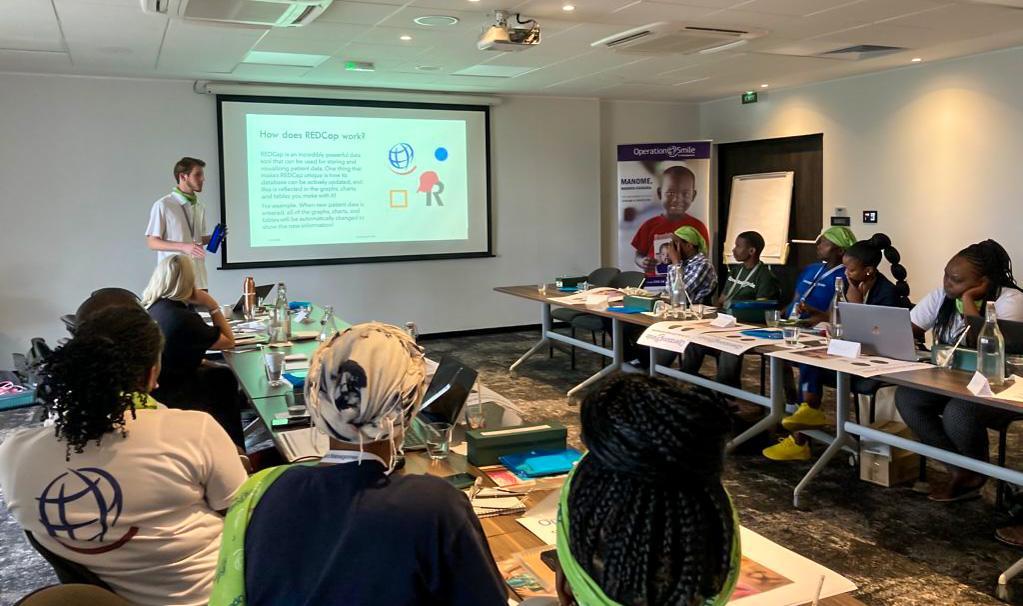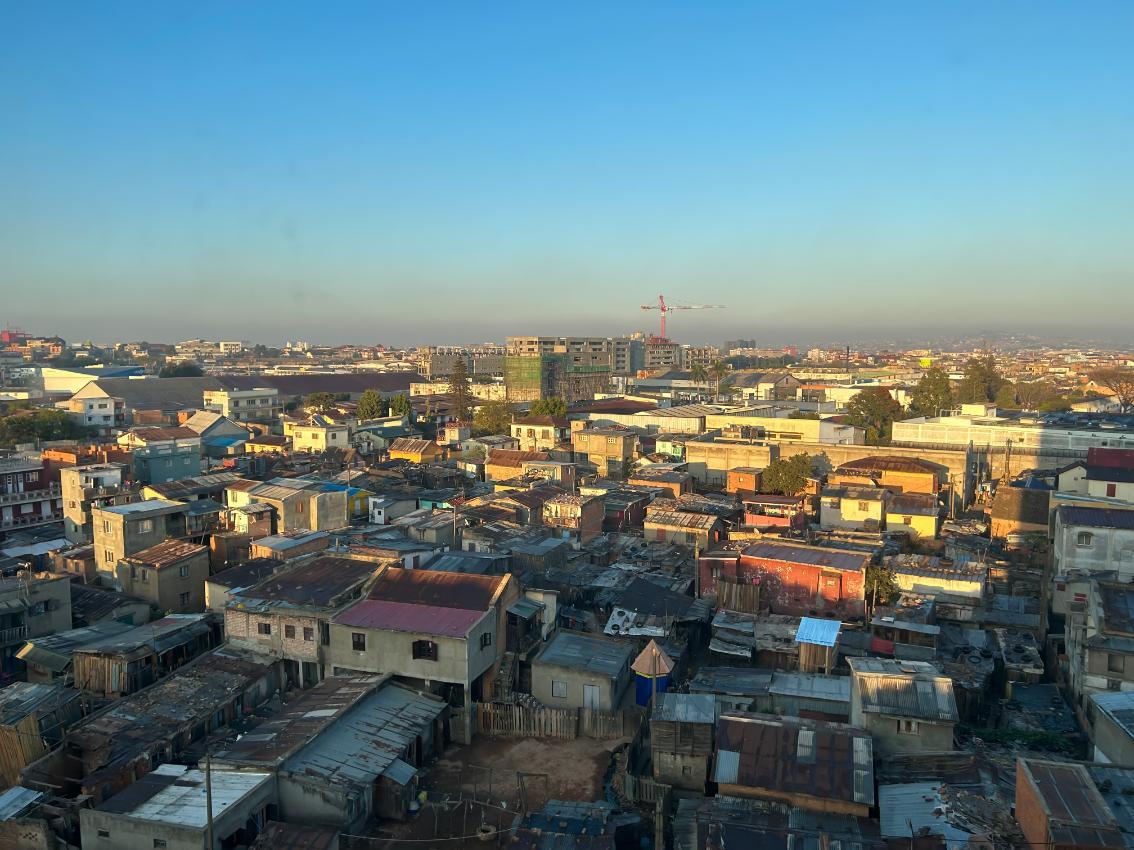

When a family friend suggested Jackson Ornoff ’24 apply for a summer internship in the IT department at a Virginia-based charity, little did he know months later it would lead him 9,000 miles around the world to Africa and one of the most memorable experiences of his lifetime.
Ornoff, a computer science major from Chesapeake, spent last summer interning at Operation Smile, a nonprofit medical service organization headquartered in Virginia Beach that provides free cleft surgeries and comprehensive care to patients around the world. A cleft condition is a gap in the mouth that didn’t close during the early stages of pregnancy. It is estimated that worldwide a child is born every three minutes with a cleft condition.
Assigned to the Sub-Saharan Africa team, Ornoff was asked to develop a user-friendly dashboard that would show real-time data about the organization’s roughly 4,000 cleft patients across Africa. The Longwood senior went to work using REDCap, a nonprofit-focused software program that is good for database visualization. It took him most of the summer but he succeeded, and last fall he was invited to travel to Madagascar to present his work and teach Operation Smile patient coordinators how to use the tool he built.
I’ve never been in a room of such a diverse, uniquely motivated and passionate group of people. It was a little intimidating. But very cool.
Jackson Ornoff ’24 Tweet This
“I’ve never been in a room of such a diverse, uniquely motivated and passionate group of people,” he recalled. “It was a little intimidating. But very cool.”
He built a dashboard for each country, including a breakdown of its regions, and built one dashboard that combined data from all of the Sub-Saharan countries. When a patient is initially screened, the patient coordinators and volunteer team enter important information, including which region of the country the patient is from, into the dashboard.
“I have it set so that it counts the number of active patients in each region so we can track where certain patient conditions are more prevalent,” he said. “That is useful information they haven’t had before. And since it’s being updated in real time whenever a new patient form is entered, headquarters immediately has access to it, giving us all the information we need both for data security and for visualization purposes.”
Being able to maintain real-time and persistent data was a big technological upgrade because patient information had previously been tracked using a mix of paper Excel tables and forms that would often get lost or destroyed.
I had never really seen patients with my own eyes until Madagascar. They were so excited to see us. It was awesome and the most impactful part for me.
Jackson Ornoff ’24 Tweet This

The most memorable part of the trip for Ornoff was visiting a patient village, where his group was greeted with song and dance by the children and their family members and caregivers. “I had never really seen patients with my own eyes until Madagascar,” he said. “They were so excited to see us. It was awesome and the most impactful part for me.”
Ornoff said some people question whether cleft repair is truly necessary or label it a form of cosmetic surgery and that, before his experience in Madagascar, he didn’t fully understand the life-changing impact of the surgery. Ornoff said he learned that children with cleft conditions often experience detrimental health and psychological effects and lead very isolated lives.
Many babies with cleft conditions are malnourished due to their inability to breastfeed properly, and, due to their appearance, children are often shunned.
“If you have a cleft lip or a cleft palate, the kids will be bullied their whole lives,” he said. “It’s hard for them to make friends. It really, really separates them from society.”
Ornoff, who is a member of the Cormier Honors College for Citizen Scholars and has a minor in geographic information science (GIS), has continued to do some internship work for Operation Smile during his senior year. Last fall he did a GIS-related independent study with Dr. Kathy Gee, associate professor and program coordinator of environmental sciences, and Dr. Ravi Sankar, assistant professor of environmental sciences and geography. His project involved creating a script that goes into mapping software to improve and better automate the dashboard visualizations.
Ornoff said his experience in Madagascar further fueled his drive to do more of this work. After graduating in May, he plans to move to Williamsburg and work full time in Operation Smile’s IT department.
My big thing is, when I have a career, I never want to have a day where I question the morals of what I’m doing. I always want to be helping and doing good work.
Jackson Ornoff ’24 Tweet This
“My big thing is, when I have a career, I never want to have a day where I question the morals of what I’m doing. I always want to be helping and doing good work,” Ornoff said, adding that his work with Operation Smile makes him feel he’s saving lives even though he’s not doing the surgery itself. “It totally changes someone’s life and brings them back into their normal society.”
While his trip to Madagascar took him overseas, Ornoff has also taken advantage of an eclectic and wide range of experiences stateside during his four years at Longwood.
He researched the trans-Alaska oil pipeline and studied the spruce bark beetle in Denali National Park during his trip to Alaska for a Brock Experience. His spruce bark beetle research later led to a student research showcase project using GIS.
He backpacked, camped out, cleared paths and cleaned up trash in state and national parks in Florida, Georgia and Virginia as part of the Alternative Breaks student organization, which he now serves as president. And as a member of the Camerata Singers, he traveled to Maryland to sing The Defiant Requiem and to New York City to sing at Carnegie Hall.
All of this is pretty incredible, Ornoff noted, considering he arrived in Farmville without a declared major and lacking a sense of what he wanted to do in life after college. He says Longwood made these varied experiences possible, allowing him to find not only the things he’s really passionate about but also a direction for his future.
“Getting out and seeing so many different people, so many different sides of every single issue, and seeing there’s more than can be solved by a single person,” he said. “I think that finding these awesome exploratory opportunities is imperative.”
